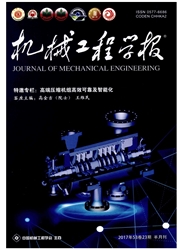

 中文摘要:
中文摘要:
航空发动机作为典型的复杂机电系统,具有失效模式多样性的特点.多失效模式相互作用,实质上是竞争失效的关系,导致航空发动机剩余寿命预测的复杂性.针对航空发动机失效模式及失效规律特点,提出基于竞争失效的航空发动机剩余寿命预测方法,解决航空发动机健康管理的核心和关键问题.分析航空发动机两类失效模式——性能退化失效和突发失效的作用机制及相关性,构建基于竞争失效的航空发动机剩余寿命预测体系.结合航空发动机不同失效模式及数据特点,分别针对性能退化失效和突发失效建立剩余寿命预测模型.利用贝叶斯线性模型融合状态监测信息,建立航空发动机性能退化轨迹模型,实现针对不同性能退化情况下的航空发动机剩余寿命预测.以分析性能退化规律为基础,利用航空发动机故障信息,建立混合Weibull可靠性模型,量化性能退化失效对突发失效的影响,实现航空发动机突发失效剩余寿命预测.通过算例,验证提出方法的有效性.结果表明,考虑竞争失效的多模型剩余寿命预测技术能客观、准确描述航空发动机寿命变化规律.
 英文摘要:
英文摘要:
Aircraft engines are the typical complex electromechanical system,which have multiple failure modes.The interaction between multiple failures is completing failure in nature,which cause the complexity of residual life prediction for aircraft engines.The residual remaining life prediction method is proposed in consideration of the characteristics of failure modes and law,which is the key and core for aircraft engines.There are two category failure modes,which are degradation failure and sudden failure.In consideration of the mechanism and relation between degradation failure and sudden failure,the residual life prediction system is built.Considering the characteristics of data and failure mode,the residual life prediction for performance degradation and sudden failure is built respectively.Bayesian linear model is used for monitoring information fusion and degradation path is built on the residual life prediction of performance degradation.The mixture Weibull model is built on the basis of failure information and degradation path on the residual life prediction of sudden failure.The advantage of the model is shown and the effectiveness of the method is demonstrated by examples.The results demonstrate residual remaining life prediction based on competing failures has the function of describing the lifetime change law of aircraft engines objectively and accurately.
 同期刊论文项目
同期刊论文项目
 同项目期刊论文
同项目期刊论文
 期刊信息
期刊信息
